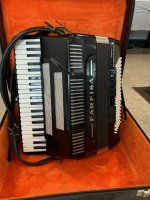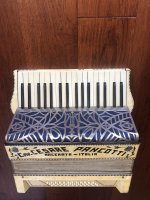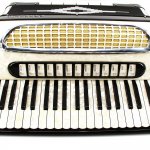Thanks to you all for the kind replies! Some of you make me wonder if I would really want to go that route.. Especially if it is going to cost about $500 to do it!
This is the accordion I have, a very beautiful instrument that I really want to love. Perhaps the reason it struck me so much about the dry tuning is that I was comparing it along side my FARFISA Super Syntaccordion, (modified to be only accoustic, with the electronics removed) and that one has a definite tremolo.
I like the instrument better from the Concerto, but I think I like the sound better from the Farfisa.

I can't afford to keep both. I paid just under a thousand for the Concerto, and about 1200 for the farfisa.




